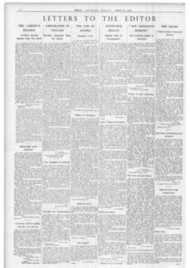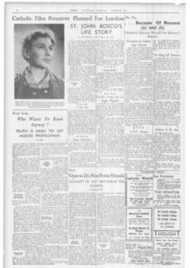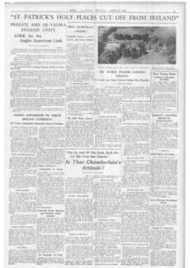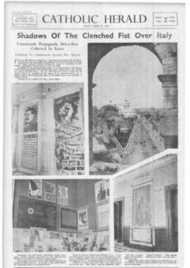Page 5, 25th March 1938
Page 5

Report an error
Noticed an error on this page?If you've noticed an error in this article please click here to report it.
Tags
Share
Related articles
In A Few Words
The Real Belloc Brought To Life
In This Extract From A New Book On English Catholic
Last Of The Giants Of The Golden Age
Hilaire Belloc Contends That The Church Of England Got Its
WHAT HAPPENED TO THE CHURCH LAST WEEK
By Hilaire Belloc
wHEN fashion or custom. or mere ignorance, prevents people from mentioning in its right place and proportion, the most important part of any problem, the understanding of that problem is necessarily warped.
If you tried to explain the Irish question to, let us say, an Italian, who had never seen Ireland, or met an Irishman, and were to leave out the Land question, you would leave him quite ignorant of what Ireland was. If you were to try to describe modern America tisha Frenchman who had never seen America or Americans, and left out, or left unemphasised, the part played by the great industrial towns, with their masses of proletariat and the denomination in them of concentrated capitalism, the man to whom you spoke would end by knowing nothing of America.
The Real Issue Unadvertised Now today in England our Press behaves after this fashion in the matter of Austria, and the recent subjugation of Austria by the Prussian Power acting from Berlin, The whole problem is really religious—and yet our Press never emphasises that point! Austria was—and presumably will be for some time to come—the especially Catholic part of the varied German population: of the whole German culture.
Of the nearly 20 million families who speak German, and have the German habit of life, about half are Catholic by origin. The other half are what used to be called " Protestants "—most of them Lutheran, a minority Calvinist, and though few of this " Protestant " half retain the old Protestant doctrines, all are at any rate hostile or indifferent to the Catholic Church. The old Protestant doctrines have nearly disappeared among them, but the social effect of Protestantism is still strong among this half of the Germans. They are proud of having become the leaders of the whole race. Berlin, their centre, has become the National capital, and, ever since the triumph of Bismarck, a long lifetime ago, it is the non-Catholic, or anti-Catholic, side of Germany which has given their tone to German things all over the world.
Influence of Prussianism
On the Catholic side of Germany, the living Catholic Faith greatly weakened as
their ideals, these at least seemed to me to be men to be admired.
In concluding these few glimpses of Red Spain as I saw it, let me repeat that I have simply tried to record objectively some of the things 'I saw and heard for the benefit of Catholic readers who have naturally been made far more familiar with one side than the other. I was dealing not with responsible and culpable leaders, but the rank and file. T have not been concerned to judge between the issues or to teach lessons about the meaning of the war. Looking back my main impression of the victims is one of lamentable waste, young minds often distorted by circumstances beyond their control, and many brave men. This is war as seen from within : it is for others to judge whether it has been necessary because of their politicians and the leaders.
the Prussian Power centred in Berlin increased.
There were large peasant districts in the valleys of the Moselle, of the Rhine, and of the Danube, which retained an active Catholicism. The mountain districts also of the South, notably the Tyrol, were, and ate, among the most vividly Catholic parts of Europe. But in the great towns, and among the industrial proletariat, the practice and even the memory of the Faith has dwindled. This was notably the case in Munich. as in the larger European centres everywhere.
But Austria, taken as a whole, was the core and rallying point of Catholic influence among Germans. On this account, more than on any other, the sur vival of Austria was a stumbling block to the new despotism erected by Hitler and his little clique. The driving power behind these men and their leader was Nationalism, or rather the racial feeling: the worship of Germanism by the Germans, substituted for the Universal Catholic habit of mind,
The Failure of Youth
Therefore the interest of the latest developments in this rapid change, the interest of the fall of Austria and its occupation by the North German Government of Berlin and its spirit, lies in the heavy blow it delivers to the Catholic tradition among the Germans.
The men and women of the German culture were, as I have said, to the extent of almost exactly one half, Catholic in tradition, although nothing like one half Catho
lic in practice. if you count in the German-speaking people of Switzerland, with those of the old Reich, and those of Austria, and the; as yet, un-annexed German groups around Bohemia (which people today call " Czechoslovakia ") and the small German population of Polish Silesia, about half the human souls therein would be reckoned nominally as Catholics. that Catholic half, it is the older people who still strongly adhere to the Faith, and the younger people who have been swept off. their feet by the new religion of race; that is, by the new religion of self-worship.
If English People Would Realise . .
Therein lies the danger for the future.. Under despotism centred in Berlin, every effort will be made to prevent the training of youth in the Catholic tradition. That is what is meant by the partial, but continual persecution of Catholic educational institutions, and by all the efforts made in a hundred forms, for forcing the decay of Catholic things and tradition among Germans. These efforts have not yet entered deeply into the social life of the Catholic peasant districts, but they are beginning to have their effect even there.
With the disappearance of Austria as an independent State, the process of deCatholising the Germans has been heavily rein fo reed.
If only people in England could see that point, and underline it, and repeat it, they would understand what has happened and have a real vision. Instead of that, they get a false picture because the main element in the whole affair is put wrongly, or minimised, or sometimes left out altogether.
blog comments powered by Disqus

















